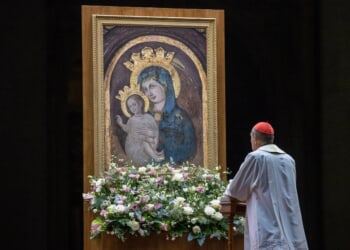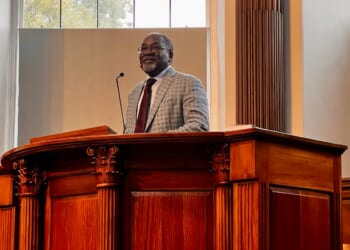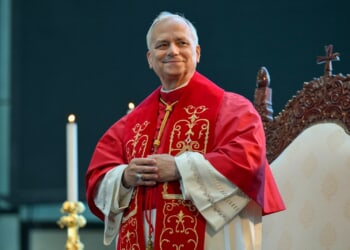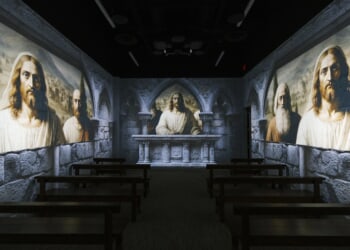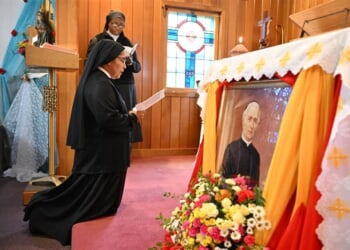Charlie Kirk’s voice is everywhere. The Zohar teaches that righteous persons are found more in this world after their passing than when they were alive. The righteous live for something larger than their merely mortal self. They emulate the model of continuous self-transcendence that God sets before all His creatures. The things to which the righteous dedicate their lives transcend mere mortality. Their dedication defines their identity, and so their lives transcend mere mortality, and endure and triumph.
The final word is not with those who see the whole world as a meaningless competition for power.
In a recent podcast, Kirk was engaging a student who was telling him that diversity is the most important of all desiderata. Charlie had a keen sense of when someone’s ideas were not thought through. He had an even keener sense of how to win hearts, not just arguments. He employed facts and logic, but more importantly, his words and demeanor conveyed impeccable respect. He made a space in which his interlocutors felt able to listen, reconsider, and internalize his critique. He did that to perfection in this snippet, proposing to the student that today, a better case could be made for unity than for diversity as our supreme aim.
In an age in which diversity has become a shibboleth, Kirk’s criticism was apt and hit home. The diversity that Wokeism promotes is no transcendent value, but rather a word wrenched into a very specific and narrow meaning. It is the linchpin of a kind of modern-day caste system in which one’s social rank is assigned according to one’s group’s standing in a non-debatable hierarchy of victimhood. This woeful system is familiar enough to The American Spectator readers to forgo devoting further space here to its outlines.
Kirk’s presentation of the opposite claim was made with such simplicity and understated authority that it revived the concepts of unity and diversity in their natural usage in language, reviving with that a whole world of thought that Wokeism had intentionally obscured.
Unity has a powerful pull to it, enough so that our national motto testifies to its worth — E pluribus unum — out of many one. And any participant in Wokeism knows that its doctrines brook no dissent — in fact, merely to question it is tantamount to heresy. Wokeism demands conformity even in thought; like the Marxist manure that fertilizes its thought, it considers wrong thinking to be a violent assault — and so is ready to use violence to stop thought with which it disagrees, at the very least by creating explicit permission structures for those who will choose to be beloved martyrs of the Woke cause.
The biblical tradition that is the foundation of Western civilization has long taught that all of existence is upheld by a Singularity. In the language of the great medieval thinker Moses Maimonides, “The foundation of all foundations and the pillar of all wisdom is to know that there is a First Existent through whose true existence all existing things come to be.” This master concept allows a proper unfolding of a consciousness: the scientific endeavor to probe beneath the outer phenomena of the world for organizing laws; and the moral endeavor to flourish through offering a supreme exemplar of generosity and love — the Creator of Genesis who grants being and consciousness to things which otherwise would not even exist. More profoundly, the love is evident not only in His bearing with His creatures through their inevitable errors but in offering them the possibility of redemption — if only we will take it up.
All that was present in Charlie’s simple words. As they so often did, those words hit home and opened up a whole new light in the heart and mind of Charlie’s questioner.
The Biblical tradition is quite clear. No one descriptor exhausts all meaning. As in Isaiah’s divine message to King Cyrus of Persia, “I am the One who forms light and creates darkness, who makes peace and creates evil.” Light and dark are mere polarities, each one a partial and complementary expression of the great Oneness. And in light of that complementarity, Isaiah then sets forth to Cyrus the pre-eminent oneness that is God alone: “I am the Lord, and there is no other.”
This is the sense of oneness and unity that informed Charlie Kirk, who as he moved forward, came to understand himself more and more as a person of faith, whose loyalty was to God in the first place and to all else only as set in order by that supreme allegiance.
For in the biblical standpoint, the value of all things are as they stand within God — light as it serves God’s purpose and darkness as it serves His purpose as well. No more can one thing exist without another than could one have beautiful music with no rests; or than we could discern anything at all with our eyes after looking straight into the sun; or than we could use the power direct from the dynamo at Niagara without stepping it way down before plugging in our laptop.
It’s not likely that Kirk was really plugging unity as the supreme concept either. The Nazi slogan ran: “One People, one Reich, one Führer!” That kind of oneness tolerates neither freedom nor freedom’s God. The enforced unity that is the hallmark of every dictatorship, and that is aspired to by the wanna-be totalitarians of Woke is a mockery of the pre-eminent divine unity.
The Unity at the core of biblical civilization is the source of law and its order. It is equally the source and foundation of love. In the Bible, love and law are not contradictory, but complementary. The Biblical Creator brings into existence beings He knows in advance will err, disobey, or rebel. He supports their being even as they rebel against him — they would not exist otherwise. He sees this world in all its imperfection as good and says so six times before the first chapter of His book is through, even saying at the very end “Very good!”
An ancient rabbinic tradition, set down in writing not quite 2,000 years ago, declares that “Very good!” was God’s response to His creation of the drive to do evil in the human being. The meaning of this is not the demonically obtuse idea that God wants evil, but rather that there is nothing better in the world than overcoming evil. God is willing to allow contradiction and rejection for the mere possibility of our freely choosing to embrace God and goodness.
This is a profound concept of unity. The One includes within Himself the entirety of the universe, which He still continuously transcends. The oneness is at one with the entire world of change and difference and individuality. The oneness is only more profound for this absolute commitment to the goodness of creation.
This oneness informs us from within and from without that we are the likeness of God and He is invested in us all. Within our granted powers, we can meaningfully choose to emulate God’s own self-transcendence and include the lives of others within our own. We can find our own core identity that makes a dynamic, unfolding whole out of our own inner chaos. Simultaneously, we can find the point of unity in the midst of the chaos of our human societies, which we still see consumed by the constant clash of the Hobbesian war of all against all.
That was the message Charlie Kirk was bringing to his young counterpart. The final word is not with those who see the whole world as a meaningless competition for power, in which the only moral rule is deference to whoever has higher status in an arbitrary intersectional hierarchy. It is a world without hope, all meanings subverted in advance, so that the least questioning triggers fear and even violence.
Charlie made God’s reality palpable to people, speaking with a whole heart and mind. He offered his thoughts to the internal verification of those who would accept his challenge. He needed no coercion. He was demonstrating how the politics of liberty is built upon the “foundation of all foundations and the pillar of all wisdom.”
His presence is felt even more now than in his mortal life. Everyone who gets his message knows he or she must share it.
We will.
READ MORE from Shmuel Klatzkin:
The Religious Foundations of Freedom and Democracy
Empty Words From Western Allies
We Can and Will Triumph Over the Subversion of Language and Thought












